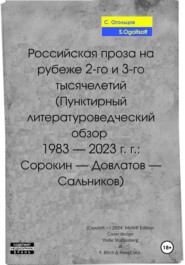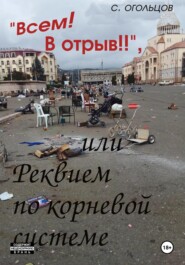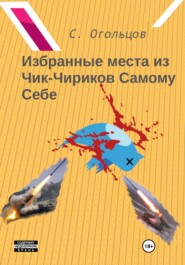По всем вопросам обращайтесь на: info@litportal.ru
(©) 2003-2024.
✖
The Rascally Romance (in a single helluva-long letter about a flicking-short life)
Настройки чтения
Размер шрифта
Высота строк
Поля
The defeated rose and, seeing that I was still there, shot off an ardent confused oration to sing the strength of spirit, before which physical strength was nothing because only the spirit had power. In Konotop, every other passer-by is a born lord-speaker.
To morally support defeated Demosthenes, I noted that during the fight the girl held exactly his things but not the fur "potty" hat of his opponent, which also had been knocked off in the snow. Hearing the words of consolation, he shut up and hastily checked the pockets in his jacket because, with all his innate love for oratorical art, the common sense is a more prominent feature in a Konotoper…
And no one could ever forbid me seeing to it that women of our team each year on March 8 received flowers—callas—one flower for each female bricklayer because I was not a millionaire and the mujiks on our team not every year guessed to ask how much it cost and collect a ruble off a man. However, the reimbursement for the expenses did not bother me much. I discovered that I liked giving presents much more than getting them myself.
But first, I had to find the city greenhouse which was as far as hell itself. You have to get off streetcar 2 one stop before the route terminal. Then take the left turn, and stomp for half-kilometer along the streets from the Civil War period. Like, Yudenich Street or, say, Denikin Street. The names though were quite Soviet, but the look and feel unmistakably White-Guardian…
When I came to the greenhouse for the first time, the manager took me into a long squat structure with its gable roof made of squares of muddy glass dripping the large rare drops of condensate. She wanted me to see for myself there were no flowers. As for the sprouts in those beds, the callas there had not yet matured, not "flared up", they were just narrow white tubes not turned into the wide-lapel muzzles.
And then, with all my tongue-tied speech problems lost and missing, I gave out a sample piece of Konotop oratory. That was to her, who every day was walking among the greenery of the greenhouse, those callas looked not ripe. But for women on our bricklayer team, who day after day saw nothing but crushed bricks, mortar and icy hillocks of dirty snow, those callas, even in that not "flared-up" form, were the most beautiful flowers…
Since then, while I was working in our team, I never was said "no" in the city greenhouse on the eve of March 8. And I proudly transported on a streetcar seat a sheaf of green-and-white callas that would appear in The Flowers store by Peace Square no sooner than in a half-month…
~ ~ ~
My decision was final and irrevocable – it's time to sum it up. The story I was translating should close the books. That was enough of Maugham for me. Even the fact that the concluding story had to be translated twice could not overturn my resolution.
I was forced to translate it for the second time because Tolik Polos path-lifted my briefcase, which, as it was, contained nothing but the copybook with the last translation, Giulia Lazzari it was, when in the morning I took it with me to go after work to Zhomnir in Nezhyn. At such an early hour in the Settlement, you hardly met any passers-by, still less along the railway tracks to the station. Approaching the concrete wall around the KahPehVehRrZeh Plant, I remembered money for the local train ticket, which I had left behind. The absent-mindedness made me go back leaving the briefcase alone to wait by the service passage for my return.
On the way back to 13 Decemberists along the Settlement streets, I met only Tolik who walked in the opposite direction. He also graduated from School 13 but 2 years after me… Grabbing the forgotten money, I came back to the path by the railway tracks. The briefcase was nowhere to see. Only Tolik and I had walked that path. Or was there some unknown third?
The answer was received a week later on streetcar 3. Tolik did not say "hello" to me, he only was making faces from his seat, in the style of Slavic Aksyanov at the "Dophinovka" mine. But—most importantly—his right hand was plastered. Who would need a straighter indication that it was he to pick up the lonely briefcase in a desolate spot? Not me.
(…at times in my life, I'm able to not only see but also read the signs…)
On the whole, the work that followed was not a re-translation, poor Giulia made to betray her lover was sitting vividly enough in my mind and, a month later, I took my last translation to Zhomnir, but already without the briefcase. So, albeit with a month's delay, my decision to part with Maugham got executed. However, it was only a part in a broader plan of action.
Like any other of my plans, it was lacking clear concrete details. My plans, as it were, could hardly be called plans at all, being, like, feelings that it was necessary to do this or that. Details to the plans came only afterward – in the course of execution. The mentioned broad plan arose because I, finally, realized that Zhomnir would do "match-making" for none of my translations. Both never, and nowhere. And it did not matter why, the main thing was that it was for sure. So what now? Very simple, the issue of publication should be solved in a do-it-yourself way.
To go that way, I had to take from Zhomnir all my translations in thin copybooks for school, of differently colored covers, piled somewhere among manifold heaps of paper on his archive chamber shelves… I arrived in Nezhyn and announced to him my intention to take back my still-not-alpha versions of Maugham in Ukrainian. Zhomnir did not object and did not ask any questions.
He arranged a feast because during these years I became sort of a distant relative in his house. A dinky needy relative of no consequence, but handy at times when, say, pasting the living-room in his apartment with the wallpaper… We sat at the square table, pushed from the wall to the center of the living room, and ate everything being brought by Maria Antonovna from the kitchen. We drank a strong village hooch. Zhomnir was enthusiastically discussing the gold pectoral of great artistic value, recently excavated from an ancient mound in the steppe. Changing the subject, he asked how my current relations with Nezhyn were, meaning Eera.
I proudly stated those relations to be fruitful, meaning you. Then I cautiously asked how Eera was.
"How what?" answered Zhomnir. "Whoring about the city."
Of course, my logic was deductive enough to know the answer to such an elementary “how”. I even could visualize it easily if not for untimely distractions popping up, like, “look! What a strange bird over there!”, or else, “Where did I misplace that thing the other day… What was it a Thursday? I definitely could not find something on Thursday but what was that?” and so on… And now, having my nose paternally rubbed into it was fully deserved. Well, yes, maybe below the nose, I felt sledge-hammered into my plexus, although his reply rammed me not as hard as the words of Eera that she had a certain Sasha, about who she cared to inform my sister Natasha, who withheld the news until my divorce with Eera, to make a booby prize of it, I suppose. Yet, most of all I was bewildered, stunned, in fact, by Zhomnir’s literal reprisal of the response got from the slob to my inquiry about Olga, back at the Konotop Brick Factory…word for word, not a hair-breadth variance…
(…for all the difference in educational and cultural level, when we need to knock our neighbor's brains out, we use the same good old stone ax…)
When it was time to set off for the local train, Zhomnir put all the copybooks with my translations in a cellophane bag that turned tight and heavy, and went out to escort me to the station. That hooch was damn well strong stuff, but I remember how the local train pulled up and hissed to slam the doors open. Refusing Zhomnir's assistance, I headed into the round tunnel of the car vestibule thru the curved gleam of nickel-plated handrails in its unsteady sides. Catching the left one, I climbed inside, went over to the opposite, closed, door and hung the bag on the top-knob of the handrail there. The last thing I heard was the sound of the door slamming shut behind me…
Slowly coming to my senses in the gradually emerging car vestibule, I still had the top-knob of the handrail clutched in my left hand next to the closed door. The train stood as motionless as I, at the fourth platform of the Konotop railway station. It was empty of passengers because according to the timetable its departure to Khutor Mikhaylovsky was in 2 hours after its arrival in Konotop.
The sight of the empty handrail beneath my clutch turned my abdominal muscles stone hard and stopped still my breathing. On the remaining 3 top-knobs in the car vestibule, there was no cellophane bag either. Slamming the sliding door, I went into the empty car and glanced along the empty rack rails above the windows, then I returned to the vestibule and exhaled: hooooey!
I did not feel like sitting in the leatherette-covered seats of the empty local train, I walked thru the underground passage and over the station square to the Loony park, to a hard, wooden, bench. There I sat for a long time without any thoughts, only now and then seeing myself in the form of a stupidly frozen statue by the handrail, while they were removing the cellophane bag. Who?!. Doesn't matter, makes no difference… Whoever the pillager, they hardly got happy with so a useless spoil, except for kindling firewood in their stove, it would do for quite a few winters.
After the stupefied shell-shock sitting for about an hour, I remembered that it was SMP-615 on-duty day in the public order squad and I dragged myself to the stronghold room to sit on further – indifferent, detached, and silent.
Only with the arrival of the militia officer, I knew what to do next. "Comrade Captain, lend me 3 rubles till our next turn on duty."
"I do not lend in rubles. Only in days of arrest. 15 enough?"
His dull wit only confirmed the correctness of my plan… The next day, 3 rubles were borrowed from our team and, after work, I went to Nezhyn. There, in the five-story block for the institute teachers in the Count's Park, I found the apartment of ever-smiling Nona and said her that, after several years of work, I lost all of my translations from Maugham. Now, for their restoration, I needed the originals of the stories, all of which were collected in the four-volume edition by the Penguin Publishing House that was in her possession. Could she, please?.
Wearing her usual sweet smile, Nona brought the books, placed them into a cellophane bag, and handed over to me. Enormous joy nearly stopped my heart pounding – thank you!.
"How do you like it, Maria Antonovna? That rapscallion Ogoltsoff lost all of his translations in the local train!"
"Because you shouldn't have made the poor boy drink so much!"
Maria Antonovna also did not know that all my misfortunes or joys, ups, and downs, all my pleasures, and deprivations sprung from that rascal on the Varanda River bank in the inconceivably faraway future…
~ ~ ~
"The habit's a heavenly gift
To substitute for happiness…"
This immortal lines of the great classic implies unequivocally, that for the third time they raked me up exclusively out of the developed habit… And that time almost everyone in SMP-615 knew that any other day they would nab me.
2 years later, at an accidental meeting on the narrow trail along the railway embankment, behind the sports grounds on the outskirts of the engineering college, that knowledge was disclosed also to me by the retired Major Petukhov, the then head of the personnel department at SMP-615. Without any pressure or leading questions on my part, Petukhov gave me an account of how the superintendent Ivan was coming every other day from the construction site to the personnel department head’s office to call psychiatrist Tarasenko about my latest deviations.
"He sang this morning. Maybe it's time?"
"Let him sing."
"He wrote an explanatory note in verse."
"What note?"
"He lost his helmet and I demanded to write an explanatory. Will you come after him?"
"Not yet."
"He shoved his shirt into a hole in the bridging slab and buried it with mortar."
"That's it! Make sure he doesn't get away."
Singing at the workplace I allowed myself not every day, but rather often. At times, especially when a construction site in At-Seven-Winds drowned in a cold dense fog, one or another bricklayer from our team would ask, "Sing, Sehryoga!"
"I had a wife,
She loved me so much,
And just one time she cheated,
And then she made her mind:
Eh! One time, yes, and once again,
And many, many, many, many more times again…"











